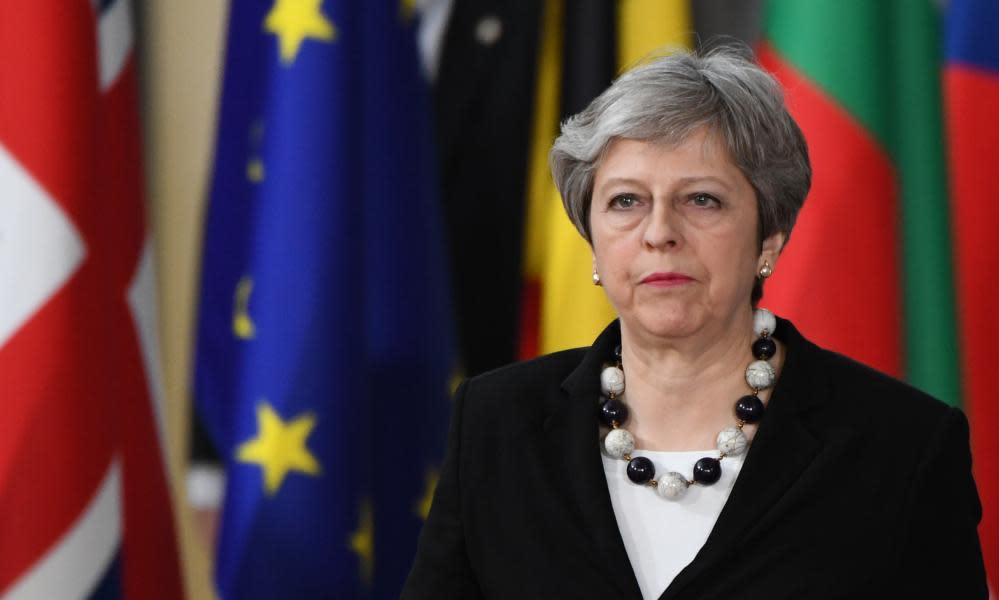UK 'needs darkest hour' in Brexit talks before giving ground

The British government will have to experience its “darkest hour” and stare into the abyss of a no-deal Brexit before it will cave in to Brussels demands, senior EU diplomats have predicted.
Ahead of a summit of EU leaders in Salzburg, diplomats in Brussels privately warned that Theresa May still needed to make a significant shift on her red lines for a deal to be possible, with the Irish border issue remaining a major hurdle in the talks.
The stark prediction came as a French government official said that the president, Emmanuel Macron, wanted to nail down the key terms of the future deal now, rather than allow any ambiguous drift on the major issues after 29 March 2019.
That is at odds with the UK environment secretary, Michael Gove, who had claimed over the weekend that any deal with the EU on the political declaration could be undone by MPs after Brexit, as he urged his Tory colleagues to support the Chequers proposals “for now”. Brussels wants credible assurances from May that any deal will not be unpicked by her successor.
The prime minister is only to be given “a few minutes” to talk to leaders at a dinner on Wednesday night in Salzburg before the 27 talk among themselves the following day, in a sign of the low expectation that she will have anything significant to say until after the Conservative party conference.
EU diplomats said they feared that the UK government would have to be pushed to the brink of the economic disaster before it does move on the most contentious issues.
Christine Lagarde, the IMF’s managing director, warned on Monday that a no-deal Brexit would deliver “reduced growth, an increase in the [budget] deficit and a depreciation of the currency”.
“A lot of movement is needed by the UK side before we can actually reach agreement”, said one senior diplomat. “We need a substantial change in the UK red lines still.”
A second EU diplomat added: “It seems that the UK needs to have a ‘darkest hour’ moment before they will shift position. But they will have to shift their position.”
The EU is insistent that it will not soften its stance that the UK needs to sign up to a Northern Ireland specific “backstop” solution, ensuring there is no hard border on the island of Ireland after Brexit in any circumstances.
The principle that Northern Ireland should in effect stay in the customs union and single market to avoid a hard border, should there no other solution be available, is not being rethought.
The Irish cabinet is expected to discuss contingency planning for border controls between Britain and Ireland in the event of there being no deal, at a meeting on Tuesday. The Irish deputy prime minister, Simon Coveney, is meeting Michel Barnier to confirm their solidarity.
Brussels is also adamant that the Chequers proposals on a common rule book and customs arrangement do not go far enough in respecting the integrity of the EU.
EU diplomats said that ambiguous “language” in the political declaration on the future deal could be found to paper over some of the differences between the EU and UK, to allow them to be dealt with after Brexit.
But they have warned that the chasm between the two sides as yet remains too large in key areas for any such compromise vision to be realised.
The French official insisted, however, that while the political declaration is not legally binding, its terms should be clear and that they will be held to by the EU during the trade deal negotiations in the possible 21-month transition period after Brexit.
“The length [of the political declaration] is not important, we think its main point is that it must be clear”, the official said.
The sources added, of the Irish backstop, that it was “something of a life insurance for the Irish border … If there is no backstop accord for the Irish border, there is no Brexit accord”.
A diplomat from another member state said: “If you look at the Chequers proposals which have some elements in it that we support – external security, internal security – these are fine.
“Chequers had some other aspects that are more difficult. So the technical customs arrangement they proposed I think is too difficult to put into practice.
“There is work necessary to find language to express in this political agreement on the future relationship which meets up the four freedoms of the internal market and at same time satisfies the position of the UK, and that of course plays into the backstop discussion on Northern Ireland.”
The source added: “We don’t quite see the [point in] the red line in having their own trade agreements that is different to what we have in place.”

 Yahoo News
Yahoo News 
